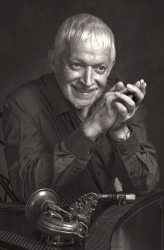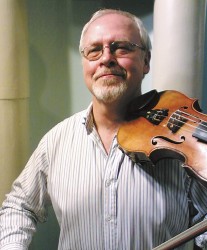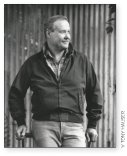Remembering Joan Watson -
Joan Watson - June 28, 1953 - March 12, 2015
Joan Watson - June 28, 1953 - March 12, 2015
 Jim Galloway (born James Braidie Galloway July 28, 1936 in Kilwinning, Scotland) died peacefully at home on December 30, 2014 surrounded by loved ones.
Jim Galloway (born James Braidie Galloway July 28, 1936 in Kilwinning, Scotland) died peacefully at home on December 30, 2014 surrounded by loved ones.
An internationally renowned jazz musician, one of the few specializing on the soprano sax (along with alto, tenor, baritone and occasional clarinet), Jim lived a full life doing what he loved most.
Listening to post-war U.S. Armed Forces Radio Services, the young man discovered jazz music, and soon was playing clarinet and alto saxophone locally. As a student at the famous Glasgow School of the Arts (1954-1958) Jim added to his reputation as a leading Scottish jazzman.
 There is an empty seat at rehearsals these days as Counterpoint Community Orchestra (CCO) starts its 31st season. The group is missing one of its long-standing members, former concertmaster and former CCO Chair, Paul Willis.
There is an empty seat at rehearsals these days as Counterpoint Community Orchestra (CCO) starts its 31st season. The group is missing one of its long-standing members, former concertmaster and former CCO Chair, Paul Willis.
For 28 years, Paul brought passion, respect and talent to the group. He was diagnosed with pancreatic cancer and succumbed to his illness on July 21, ending a life of giving to the community and to his loving partner, Alex.
Paul was CCO’s biggest advocate and gathered immense community support with his friendly and persuasive manner. On June 7, Paul was invited on stage by music director Terry Kowalczuk to honour his contributions at the 30th anniversary concert. It meant a lot to Paul to live to see CCO turn 30 and take part in WorldPride 2014 in Toronto. Paul left Counterpoint a generous bequest to hire a young person to fill the concertmaster chair for many years to come.
The orchestra is celebrating the life of Paul Willis on Saturday, November 8, 7pm, location TBA, where his favourite piece, Méditation from the opera Thaïs, will be performed by current concertmaster Emma Vachon-Tweney.
The concert will be a fitting tribute by the orchestra to a member who played with his heart at every concert. Paul studied violin and graduated from the University of Western Ontario’s music program. He went on to law school and ran a successful law practice with his legal assistant Deborah Visconti for 25 years.
Paul was a proud gay man and helped to build Toronto’s LGBTQ community in the 1980s. He was a member of “The Body Politic” collective that regularly published a newspaper that united LGBTQ people and helped them stand up for equal rights. His commitment and contributions resonated with the LGBTQ community.
Paul joined Counterpoint soon after it was founded as a safe space for gay musicians in 1984, having set aside his violin for a short time. It was a powerful experience for Paul and he thrived in a community of acceptance.
“In the early years of Counterpoint, he participated in our first executive committee and instilled the openness and love of our community in the Counterpoint constitution. During one season when we didn’t have a conductor, he even conducted the season from the concertmaster’s chair, which he occupied for many years,” said Bill McQueen, one of CCO’s founding members.
Paul rallied community support for CCO for many years and served on CCO’s first orchestra board in 2005. As CCO’s chair from 2007 to 2009, Paul helped build the orchestra into a strong community organization and set the stage for current chair, Lana Chou Hoyt.
“I saw Paul’s passion and drive while he built Counterpoint from the ground up. Paul’s leadership helped pave the way for Counterpoint for many years to come. Building a community group takes teamwork. Paul Willis was certainly the glue that kept the team together for close to 30 years,” she said.
Paul is also fondly remembered for his open and cheerful personality.
“Many members of the orchestra and the audience find our early memories of this orchestra are inextricably linked to Paul, who graced the first chair not only with his playing, but also his unrelenting smile and gracious manner,” said CCO member David Beattie.
As a great example of Paul’s giving spirit, he donated his violin to his alma mater, the University of Western Ontario Faculty of Music, so that its melody, and indirectly Paul’s musical spirit, will live on.
By Counterpoint musicians: Trish Tervit, Lana Chou Hoyt and Bill McQueen. Trish Tervit is a violinist, a Toronto-based writer who began her career as a print journalist and now works as a public relations professional. Lana Chou Hoyt is a flutist and current CCO chair. Bill McQueen is a clarinetist, founding member of CCO and former chair.
This winter has been brutal. Sunday, January 19, 2014 was a particularly cold day for music in Toronto. Udo Kasemets’ death at 94 in Toronto that day marks the passing of a prominent and prolific Canadian modernist musical iconoclast who produced new music well into his last decade. I wrote a brief appreciation of some of his avant-garde music activities in his adopted hometown, Toronto, in a 2010 essay in The WholeNote.
In reviewing Kasemets’ career it struck me that my own music career crossed his in ways both personal and professional in every decade since the 1970s. Therefore instead of summarizing his action-packed and varied life, the broad outlines of which are now accessible online, I choose here rather to highlight a few interpersonal moments, decade by decade.
 I met my good friend Larry Lake in September 1970 at the University of Toronto. The day we met, we were among a group of students taking the graduate entrance exam at the Faculty of Music. Larry already had three degrees from the University of Miami: a Bachelor of Music, a Master of Education, and a Master of Music in musicology, so why the U of T Faculty of Music felt he needed to be examined for graduate study is still, to me, a bit of a mystery. But I remember that he was seated in the back row of the examining room, not too far from another candidate, James Montgomery, and when I entered the room Larry and Jim had already bonded. I took a seat in the front row, and I can still remember that there seemed to be a social club already under way at the back of the room.
I met my good friend Larry Lake in September 1970 at the University of Toronto. The day we met, we were among a group of students taking the graduate entrance exam at the Faculty of Music. Larry already had three degrees from the University of Miami: a Bachelor of Music, a Master of Education, and a Master of Music in musicology, so why the U of T Faculty of Music felt he needed to be examined for graduate study is still, to me, a bit of a mystery. But I remember that he was seated in the back row of the examining room, not too far from another candidate, James Montgomery, and when I entered the room Larry and Jim had already bonded. I took a seat in the front row, and I can still remember that there seemed to be a social club already under way at the back of the room.
We three were all deemed acceptable for graduate study, and soon found ourselves together in the bowels of the Edward Johnson Building, home to the U of T Electronic Music Studio, in the class of professor Gustav Ciamaga. Larry seemed more interested in electronic music than in the degree program he was enrolled in, which was as a Ph.D. candidate in musicology. And he was far more intrigued by the challenges of contemporary composition than those of settings of medieval Latin. Soon he and Jim and I were spending long hours together in the studio figuring out how to manipulate the cumbersome gear on the studio racks the way a real musician would play a proper instrument. The eventual formation of the Canadian Electronic Ensemble came nearer for us all, and the musicology doctorate receded for Larry.
In 1972 Larry was offered full-time employment as a music producer by CBC Radio. This opportunity gave him the perfect motivation to park the Ph.D. and launch into a career that would harness two of his favourite activities: working with audio technology and communicating his passion for music with a national audience. And he was good at it. He quickly became the producer of several of CBC Radio’s flagship music programs: Musicscope, Themes and Variations and Music Alive. In the early 1970s, network shows were still expected to run with so-called “staff announcers”; people like Ken Haslam, Lamont Tilden, Allan Maitland and Warren Davis, to name a few — but during Larry’s tenure in Radio Music, things began to change. Highly qualified presenters were sought as the Stereo Network developed. Larry was always good at spotting talent, and he easily found Karen Kieser and hired her to host Themes and Variations. She flourished on air.
As Karen moved into program production, Larry made the CEE (Canadian Electronic Ensemble, established in 1971 by David Grimes, Larry Lake, David Jaeger and James Montgomery) his focus and his main vehicle for composing. He was a gifted composer, and the CEE was an ideal outlet for his desire to mix musical technology with live performance. The CEE began touring during the mid 1970s and we often were accompanied by an exceptional pianist, the talented, multi-tasking Karen Kieser, soon to become Larry’s wife.
I joined CBC Radio Music in 1973 and by 1977 I had convinced CBC Radio to support a national new music show for the CBC Stereo network. The new program was Two New Hours. It was originally hosted by David Grimes and Warren Davis. I could think of no better person to write for this show than Larry Lake.
The program enjoyed success, and lasted just under 30 years. Larry became the host in 1996, and was the voice of Two New Hours until 2007, when CBC cancelled the program. Larry remained with Two New Hours for its entire run because he believed deeply in the creative power of Canadian composers and musicians. His work on Two New Hours gave him a platform for developing this belief.
The fact that he was himself a gifted composer and musician, an incredibly articulate speaker and writer, and was a natural teacher made him particularly effective as an advocate for new music on air. His interviews with composers illuminated the thinking behind new compositions and helped listeners of all types to discover why composers create new music.
Larry always put a human face on these new creations. And he worked hard to introduce radio listeners to all the people that were involved in bringing the art of contemporary music to life, especially as it was practised in Canada. He introduced CBC Radio Two listeners to the next generation of great Canadian composers as they emerged. He encouraged countless young, mid-career and even senior composers to realize their creative dreams. Larry’s life and work showed them it was possible.